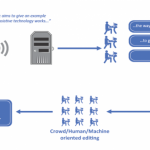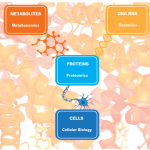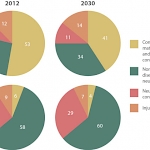
Opinion
Gene therapy
50 years after it was first proposed, gene therapy - the modification of DNA to treat disease - has gone from science fiction to clinical reality. However, as prices for gene therapies are released, widespread sticker-shock is raising questions about affordability and fair pricing.
20 July 2018

The logic of synthetic biology: turning cells into computers
For years scientists have been studying E. coli as historians would an ancient tome. Biologists, biochemists, and geneticists have dissected, poked, and prodded E. coli until it gave up its secrets: the basic principles of cellular life. Synthetic biologists, on the other hand, look at E. coli and think to themselves: “let’s make a computer”.
9 April 2017

Opinion
A Gaming Revolution for International Development
There are more than one billion people living under $1.25 a day and almost the same number playing at least one hour of video games worldwide. So, how can the popularity of games be harnessed for positive social change?
21 March 2017


Does research guide tobacco control policy in Europe?
Despite the enforcement of the revised Tobacco Products Directive, aimed at tightening tobacco control policies throughout the EU, the orchestrated attempts of the tobacco industry to influence the outcome of the vote has raised concerns that research may have less importance in the shaping of public health policies.
3 October 2016

Research
Reading the Path of Antibiotic Decline in Bacterial DNA
DNA sequencing is an exciting modern technology, that has vastly improved our ability to treat infections. However antibiotic resistance is a growing problem and DNA sequencing is revealing the challenge we face as bacteria are rapidly evolving resistance to antibiotics.
18 April 2016

Prosecuting Sexual Violence in Conflict
In light of recent news including the coordinated sexual assaults on women in Cologne, and a spike in attacks against Syrian and Iraqi women, Dr Hope Ferdowsian co-authors a timely piece reflecting on sexual violence crimes during times of conflict. Could justice be better served if clinicians extended their role and were required to provide forensic medical evidence in Courts of Law?
20 January 2016

Medical Travel & Trade: Equitable Access or Economic Grab?
As countries race to dominate the medical tourism sector and attract the wealthiest patients from around world, what damage is being caused to the health of their own citizens?
30 June 2015

Global Risk: the Wildfire in the Commons
What distinguishes many of today's problems from those faced by former generations? The interconnected nature of global issues like emerging bio-technologies and climate change raises the possibility of 'wildfire risks', where the actions of one can have a great impact on many.
24 June 2015

The City and the Triumph of Diversity
Why do urban centres thrive despite serious social problems such as crime and pollution? Cities represent the triumph of diversity over uniformity, bringing together many complementary skills and inputs to foster complex economic activities.
22 June 2015
Medical Tourism in the Tropics
Countries such as Barbados are facing legal and ethical obstacles to develop effective regulatory mechanisms for the emerging medical tourism sector.
20 April 2015

Advancing Health Research Through Online Social Networking
The recent explosion of internet-based communication and education tools has enabled medical practitioners and researchers to interact with patients in new and innovative ways.
1 June 2014

Donated Drugs Against Neglected Tropical Diseases
One in six of the world’s population live in rural areas, and suffer from poor health - especially chronic diseases caused by infection with parasitic diseases now known as ‘Neglected Tropical Diseases’ or NTDs.
1 June 2014

Mobile Health: Patient, heal thyself
As mobile health technologies become prevalent there is a need to make sure they are effective and safe, but also to understand the implications for individuals and communities.
1 June 2014

Research
Improving the Immunogenicity of Vaccines
For maternal infections such as group B streptococcus and early infant infections such as respiratory syncytial virus infection, there is now hope for the development of successful vaccines, some based on adjuvants which are designed to boost weak immune response.
1 June 2014

Assistive Technology and Audiovisual Translation
Online tools such as Audiovisual Translation (AVT) and Assistive Technology (AST) have the potential to aid the provision of university-level educational material for people with sensory impairments such as blindness and deafness.
1 October 2013

Metabonomics: The Future for Clinical Treatment?
Metabonomics, namely the observation of small molecules within a biological sample, has emerged as a new potential treatment due to the complexity of mainstream genetic and biomedical research.
1 October 2013

Biotech and Big Pharma
From improving the process of food production to keeping up with the demands of a rising population, to developing novel and sophisticated biological treatments for life-threatening diseases, biotech can and does impact multiple aspects of our life.
1 October 2013

Space Biomedicine
With many distinctive technical challenges to be overcome, the spaceflight paradigm allows numerous psychological and behavioural aspects, as well as biological and physical systems to be examined under unique and unusual circumstances.
1 October 2013

Opinion
Sexual Harassment in the Workplace
The past half century has seen leaps in women’s working rights, yet statistics show that sexual harassment is still a pervasive threat in the workplace.
1 May 2013

Ageing Societies
Better co-ordinating care, improving the flow of patient information and ensuring that adequate funding mechanisms are in place are crucial if societies are to deal with the challenges posed by ageing societies.
1 May 2013

Research
The Ageing Heart
Research based at Imperial College in the area of Popeye domain containing aims to provide a novel insight into the ageing process and potentially provide new therapeutic opportunities to help the ageing heart.
1 May 2013

Cancer: A Global Issue
While remains a widespread view that cancer only affects those in wealthier regions of the world and the elderly, at least half of cancers are diagnosed today in developing countries and these carry the greatest burden of premature mortality from cancer.
1 May 2013

Research
The Quest for a Better Bionic Hand
The hand is a crucial part of the body, and the desire to replace it following an amputation – with trauma or cancer being the main underlying causes – is a natural one. Existing bionic hands are already good substitutes for the natural limb yet a number of limitations prevail.
1 May 2013

Research
Alzheimer’s Disease
Stress caused in a particular cell organelle, the endoplasmic reticulum (ER), plays a role in Alzheimer's Disease brain cells, and has emerged as a potential therapeutic target.
1 May 2013

How to Plan a Successful Biopharma Product Rollout
Effectively launching a new biopharma product, however, has never been more challenging. In addition to a litany of regulatory issues, companies face high stakeholder expectations, numerous market-access hurdles, and stiff competition, all of which are made more formidable by the business realities of the industry.
1 October 2012

Spending the Money Wisely
All the heroic ambitions for improving global health must confront the prosaic reality of finding the necessary financial resources.
1 October 2012

Multi Drug-Resistant Tuberculosis
This article examines why drug resistant TB has come into existence, how it can be categorized, what treatment options are available and how the global health community plans to combat this growing threat.
1 October 2012

On the Benefits of Competition in Healthcare
Governments faced with rising costs and growing demand are constantly searching for methods of delivering better healthcare. Reforms which promote competition are currently very much in vogue, yet while the political appeal is simple critics argue that the features of healthcare make the use of competition inappropriate.
1 October 2012

Mental Health and the Military
Never far from the media spotlight has been the mental health of those presently serving in the armed forces, those who have served (veterans), as well as the wider military community.
1 October 2012

Antibiotics in Decline
The majority of antibiotic use is in the community, however the impact of antibiotic resistance is felt most acutely when treating patients in healthcare settings.
1 October 2012

Global Mental Health
For global health to truly deliver the overarching aim of health equality for all, it must overcome the artificial dualism separating mental from physical illness
1 May 2012






